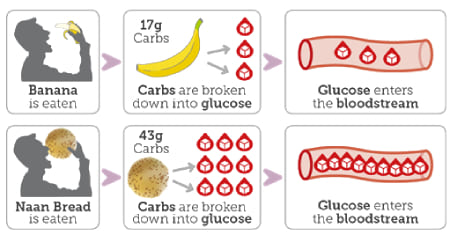Carbohydrate Calculator
Determine Your Ideal Daily Carbohydrate Requirements
Calculation Examples
📋Steps to Calculate
-
Input weight, age, and activity details.
-
Choose goal like loss or maintenance.
-
Review recommended daily carbs output.
Mistakes to Avoid ⚠️
- Using 45–65% of calories for everyone - athletes may need 70%+, sedentary < 40%.
- Ignoring Fiber: Fiber is a carb that isn't digested. For many diets, "Net Carbs" (Total Carbs minus Fiber) is the more important number.
- Too Many Simple Sugars: Getting all your carbs from sugar leads to insulin spikes and fat storage.
- Fear of Carbs: Carbohydrates are essential for brain function and thyroid health; going too low can hurt your metabolism.
Practical Applications📊
Diet Planning: Creating a meal plan that fits your macro-nutrient targets.
Performance: Ensuring you have enough glycogen for high-intensity training.
Medical Management: Helping monitor intake for those managing blood sugar levels.
Questions and Answers
What is a carbohydrate calculator?
A carbohydrate calculator determines the proper amount of carbs to consume per day in consideration of body weight, activity, and goals in order to plan nutrition and achieve health-related outcomes.
How many carbs per day should I aim for?
Though daily intake of carbs will vary, the general rule is 130 grams per day at a minimum for brain function. Adjusting intake will depend on total calories and the goal of how many carbs per day for maintenance or reduction.
Is 50g of carbs a day too low?
This is considered "Very Low Carb" or Keto. It is effective for some but should be monitored for energy levels.
Why do I need carbs for muscle gain?
Carbs are "protein-sparing," meaning they provide energy so your body doesn't have to burn muscle tissue for fuel.
How many grams of carbs per day fit active lifestyles?
To maintain moderate activity, establish your carbohydrate goal in grams depending on your body size, ideally in the range of 200-300 grams, this goal accounts for the need of how many grams of carbs per day for endurance and avoids excess storage as fat.
What daily carb intake suits weight loss?
For gradual fat loss, target between 100-150 grams of carbohydrates, in alignment with how many grams of carbs per day for weight loss, and track your process to make adjustments if necessary for daily allowances that remain sustainable.
How many carbs should i eat a day using standard formulas?
The recommended daily allowance for carbohydrates uses the formula: $\text{Grams of Carbs} = (\text{Total Daily Calories} \times 0.45 \text{ to } 0.65) / 4$, since each gram provides $4\text{ kcal}$. This range, verified by the Institute of Medicine, ensures adequate fuel for bodily processes across diverse populations.
Disclaimer: This calculator is designed to provide helpful estimates for informational purposes. While we strive for accuracy, financial (or medical) results can vary based on local laws and individual circumstances. We recommend consulting with a professional advisor for critical decisions.
